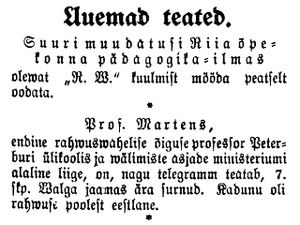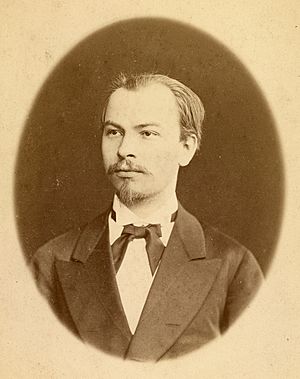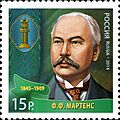Friedrich Martens facts for kids
Friedrich Fromhold Martens, also known as Fyodor Fyodorovich Martens in Russian, was a very important diplomat and legal expert who worked for the Russian Empire. He made big contributions to the field of international law, which are the rules that countries agree to follow when dealing with each other.
Martens was a key person at the Hague Peace Conferences, where countries discussed how to make peace and avoid wars. He even wrote something famous called the Martens Clause, which is still used today. He also helped solve the first international arguments using arbitration, which is when a neutral person helps two sides agree. One famous case he helped with was a disagreement between France and the United Kingdom about Newfoundland.
As a scholar, Martens is well-known for putting together 15 volumes of international treaties signed by Russia between 1874 and 1909. These books are a huge collection of agreements between countries.
Contents
Biography of a Legal Expert

"Professor Martens, Professor of International Law at the Saint Petersburg University, a member of the Ministry of Foreign Affairs has died according to the telegram at the Valga, Estonia train station on June 7. The deceased was an Estonian by ethnicity."
Friedrich Martens was born in 1845 in Pärnu, which was part of the Russian Empire at the time. His parents were Estonian. Sadly, he lost both his parents when he was only nine years old. After that, he was sent to a Lutheran orphanage in Saint Petersburg. There, he went to a German high school and did very well.
In 1863, he started studying law at St. Petersburg University. After finishing his studies, he began working for the Russian Ministry of Foreign Affairs in 1868. This was the government department that handled Russia's relationships with other countries.
By 1871, Martens became a teacher of international law at St. Petersburg University. The next year, he became a professor of public law at other important schools. In 1874, he was chosen to be a special legal helper to Prince Gorchakov, who was a very high-ranking official in the Russian government.
Martens' Important Books
Martens wrote many important books that helped him become famous around the world. His first book, The Right of Private Property in War, came out in 1869. This was followed by The Office of Consul and Consular Jurisdiction in the East in 1873. This second book was even translated into German. These books were just the beginning of many studies that made Russia's approach to international law respected globally.
One of his most important projects was a huge collection of treaties called Recueil des traités et conventions conclus par la Russie avec les puissances etrangeres. This collection had 13 volumes published between 1874 and 1902. It included not only the actual texts of the treaties but also helpful introductions that explained the diplomatic situations around them. These introductions used secret documents from Russian government records.
Martens also wrote his own book called International Law of Civilised Nations. This book was first written in Russian and later translated into German and French. It showed his great judgment and sharp mind, even though some of his ideas were not agreed upon by everyone. He also wrote other books that sometimes showed a clear Russian viewpoint, such as:
- Russia and England in Central Asia (1879)
- Russia's Conflict with China (1881)
- The Egyptian Question (1882)
- The African Conference of Berlin and the Colonial Policy of Modern States (1887)
In these works, Martens presented his arguments with great knowledge and skill, even when it was clear he was arguing for Russia's side.
Solving International Disputes
Martens was often chosen to help solve arguments between countries. This process is called international arbitration. He served as a judge or arbitrator in several important cases. One of these was the Pious Fund Affair between Mexico and the United States. This was the very first case decided by the Permanent Court of Arbitration in The Hague.
He also helped settle the disagreement between Great Britain and France over Newfoundland in 1891. Later, he was the main arbitrator in a border dispute between Venezuela and British Guiana after the Venezuela Crisis of 1895.
Martens played a big role in the talks between Russia and Japan that led to the peace agreement of Portsmouth in August 1905. This treaty helped set the stage for a later agreement between Russia and Japan.
He was also very important in setting up the Hague Peace Conferences. He was one of Russia's main representatives at the first conference. At the second conference, he led the committee that focused on maritime law, which are rules for the sea. His trips to major European cities in 1907 were an important step in preparing the plans for these conferences. He also served as a judge in the Russian supreme prize court, which handled cases that came up during the war with Japan.
Awards and Recognition
Martens received special honorary degrees from famous universities like Oxford, Cambridge, Edinburgh, and Yale. He was also nominated for the Nobel Peace Prize in 1902, which shows how highly he was regarded for his work in promoting peace. Friedrich Martens passed away suddenly in June 1909.
Images for kids
See also
 In Spanish: Fiódor Martens para niños
In Spanish: Fiódor Martens para niños
 | Jessica Watkins |
 | Robert Henry Lawrence Jr. |
 | Mae Jemison |
 | Sian Proctor |
 | Guion Bluford |



